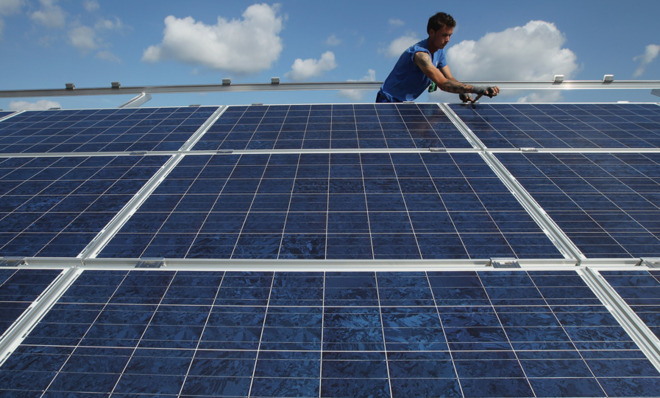Can Google go 100 percent renewable?
The internet giant says it wants to go totally green

A free daily email with the biggest news stories of the day – and the best features from TheWeek.com
You are now subscribed
Your newsletter sign-up was successful
This week, Google announced in a blog post a new $80 million investment in solar energy in California and Arizona, bringing its total investments in renewable energy since 2010 to over $1 billion. It's just the latest step in an ongoing project by Google to keep at the forefront of the green energy industry.
In an interview with the Guardian earlier this year, Rick Needham, Google's director of energy and sustainability, explained Google's shift into the renewable energy industry:
"When Google thinks about sustainability, one of the big areas that we think about is energy because that's fundamentally a core piece of what drives our company. We think what can we do as a company to make sure we're operating sustainably and the ways we can enable a more sustainable world. We ask what can we do to get us to a place where clean energy is an option for everyone." [The Guardian]
He adds that Google's ultimate aim is to derive 100 percent of its energy usage from renewable sources:
The Week
Escape your echo chamber. Get the facts behind the news, plus analysis from multiple perspectives.

Sign up for The Week's Free Newsletters
From our morning news briefing to a weekly Good News Newsletter, get the best of The Week delivered directly to your inbox.
From our morning news briefing to a weekly Good News Newsletter, get the best of The Week delivered directly to your inbox.
"We want to be 100 percent renewable. We don't have a date set for that target, but with our investments, we aim to move the market in that direction." [The Guardian]
Besides attaining the dream of clean and sustainable energy, I can think of three business reasons why Google might want to go totally green.
First, energy independence. Large corporations like Google prefer predictability, and energy input costs today are not really very predictable at all. The costs of raw materials like coal and oil vary depending on market conditions, and can be completely cut off or severely strained in the case of a war or natural disaster. If you're generating energy from your own facilities, there is no such unpredictability or risk.
Second, getting into the renewable energy business has great synergy with Google's current products. Small, powerful solar cells could be built into all kinds of devices to yield reliable, cheap power from any location. Imagine an Android phone, tablet, or Google Glass eyepiece that can be charged by sunlight. By 2020, it is estimated that there will be more than 75 billion internet-connected devices — weather monitors, medical monitors, cars, alarm clocks, 3-D printers — forming the so-called "internet of things." Solar technology will enable such devices to be powered simply and wirelessly.
Third, disrupting the current energy industry. The global energy industry is a $5 trillion-a-year business. Solar energy prices have fallen drastically over the last 40 years, from $76.67 per watt in 1977 to as low as $0.50 per watt in 2013. If the 40-year trend continues, solar will be cheaper than coal in less than 10 years time. When that occurs, the global energy market will readjust in an orgy of creative destruction. When renewables are cheaper than fossil fuels, the leaders in the renewable energy market will reap massive rewards in global energy market share. By being at the vanguard of the renewable energy revolution, Google could position itself as a next-generation energy titan.
A free daily email with the biggest news stories of the day – and the best features from TheWeek.com
Of course, Google's aim of moving to a diet of 100 percent renewable energy is still a long way from reality. One key factor that is still holding solar back is that battery technology to store solar energy — a very important factor, given that sunshine is not constant — remains relatively poor. And although solar cell efficiencies have improved and material costs have significantly fallen, solar cells still require further improvements in efficiency and reductions in cost to compete with fossil fuels.
But this is a symbiotic relationship — renewable technology needs large investors like Google. Deep-pocketed investors can throw money, research, and resources into creating more efficient and longer-lasting batteries, as well as improved panels and grids, to overcome the challenges that still exist today.
If Google dreams of a sustainable energy future, the company — unlike the vast majority of its competitors — just might have the power to make it a reality.
John Aziz is the economics and business correspondent at TheWeek.com. He is also an associate editor at Pieria.co.uk. Previously his work has appeared on Business Insider, Zero Hedge, and Noahpinion.
-
 The ‘ravenous’ demand for Cornish minerals
The ‘ravenous’ demand for Cornish mineralsUnder the Radar Growing need for critical minerals to power tech has intensified ‘appetite’ for lithium, which could be a ‘huge boon’ for local economy
-
 Why are election experts taking Trump’s midterm threats seriously?
Why are election experts taking Trump’s midterm threats seriously?IN THE SPOTLIGHT As the president muses about polling place deployments and a centralized electoral system aimed at one-party control, lawmakers are taking this administration at its word
-
 ‘Restaurateurs have become millionaires’
‘Restaurateurs have become millionaires’Instant Opinion Opinion, comment and editorials of the day